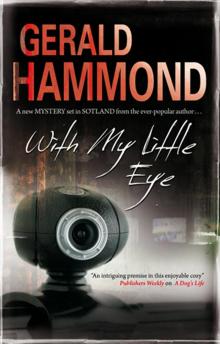- Home
- Gerald Hammond
Illegal Tender (Three Oaks Book 12)
Illegal Tender (Three Oaks Book 12) Read online
ILLEGAL TENDER
Gerald Hammond
© Gerald Hammond 2000
Gerald Hammond has asserted his rights under the Copyright, Design and Patents Act, 1988, to be identified as the author of this work.
First published in 2000 by Macmillan Publishers Limited.
This edition published in 2019 by Endeavour Media Ltd.
Table of Contents
Preface
Chapter 1
Chapter 2
Chapter 3
Chapter 4
Chapter 5
Chapter 6
Chapter 7
Chapter 8
Chapter 9
Preface
Telling stories to the best of my limited ability is, comparatively speaking, a doddle, but mysteries are Hard Work — especially when one is well past the threescore and ten, at which time both concentration and short-term memory tend to fail.
So, unless I happen on another plot which writes itself (as happened with The Reward Game and several other books), this will be my last mystery story. It will be farewell to the Calder family, to the Cunninghams at Three Oaks Kennels and to Henry with whom I now have so much in common. I wish them well. Long may they continue flying the banner of Scottish fieldsports in the teeth of those who think that they know better.
When I set off on this path, more than twenty years ago, the term ‘political correctness’ had not yet been coined or at least had not yet come to my attention, but the dangerous concept was already in the air. I had to decide whether to pander to public misconceptions and show the shooting man as the stereotyped, rich idiot beloved of fiction and the media; but I never met anyone in that image and over the whole series I have tried to show the Scottish shooting and fishing fraternity (male and female) as I have come to know and love them — coming from all walks of life and more knowledgeable and caring of wildlife than most of their critics. If I have done nothing to stem the tide I hope that I have at least left a record to contradict the propaganda of those who oppose a way of life which they have not experienced and can not comprehend.
While I was still wondering how to improve my meagre understanding of computer banking and its security, by coincidence a specialist in that field moved in next door. I am deeply grateful to Norman Edwardson for his help. Any remaining errors are mine alone.
I am also very grateful to a certain ‘John Debri’ who sent me the fraudulent e-mail reproduced with minor modifications in this book. Nice try, John!
Chapter One
‘Uncle Henry?’ said the voice on the phone.
I have never been blessed or cursed with nephews or nieces, so the voice had to belong to Elizabeth Ilwand (née Hay), granddaughter of one of my old and now deceased friends. ‘Hello, Gooseberry,’ I said.
I heard her laugh at the other end, a hundred miles away. The nickname is an old and private joke between us and one which seldom stales. ‘Would you like to come through at the weekend?’ she asked me. ‘There are one or two bits of business.’
Elizabeth had been a sulky and rebellious girl, but the shock of her grandfather’s death had begun a change which had come to fruition with her marriage the previous year. She was now a charming if imperious — not to say bossy — and sometimes headstrong young woman. Her grandfather had been an extremely wealthy man and she was his sole heir. In harness with the local solicitor, I had acted as his co-executor and was still one of her trustees. According to Sir Peter’s will, those duties would not come to an end until two years after her marriage. That clause might not have stood up to scrutiny by a court, but Elizabeth seemed in no hurry to assume full responsibility for her inheritance. Our duties, however, had become progressively lighter as she had matured and come to understand the workings of an estate which comprised much of the Borders country for some miles around her home just outside the town of Newton Lauder. The signs were that she would become as caring a landowner as her grandfather had been.
A quick, mental review of my engagements satisfied me that I had nothing inescapable imminent. On the other hand, it was late October, always a busy time at the Three Oaks Kennels where Isobel, my wife, is a partner; and although I have no formal position with the firm I am usually in demand for dog-walking, dummy-throwing, helping with the eternal feeding and cleansing and holding the fort when the partners and their helpers are otherwise engaged. This last activity usually peaks on Fridays and Saturdays.
‘Would Monday do?’ I asked her.
‘If it suits you better. But we’ll be holding the first shoot of the season on Saturday.’
I felt my interest stir like a spaniel at the sound of the gun-room door, but there were one or two points to be clarified. ‘Syndicate? Or a let day?’
‘The syndicate. And it looks as though several members will be away in France at the Rugby World Cup match. It’s a driven day, so Mr Calder says that you wouldn’t have to do much walking.’
That was certainly a consideration. Beaters are not always easily recruited and at weekends there is considerable competition from other estates and from families in need of help with the shopping. Some shoots, especially early in the season before the birds become jumpy, may be wholly or partially walked-up and, although I can still manage a mile or two on pavement and rather more on grass, I am past the age for struggling through turnip-tops or spruce plantations. The Hay shoot at Newton Lauder, however, still commanded the loyalty of a squadron of beaters and both they and the syndicate members were always considerate to one who they regarded as having probably been a contemporary of Peter Hawker and having shot with Lord Ripon.
‘I’ll be through on Friday afternoon unless you hear to the contrary within the next hour,’ I told her.
‘That’s fine,’ she said. ‘Usual drill.’ Which meant ‘No need to bring a dog or a dinner-jacket.’
As my friends are aware, my time for taking phone calls is after breakfast, when Isobel has left for the kennels and before I set off, as is my usual custom, to join her there. Elizabeth had caught me with my boots on and my stick in my hand, but I paused to phone Gordon Bream, to say that I would be passing through Edinburgh on the Friday and could make myself available for the discussion that he had been suggesting. Then, with something more to look forward to than the pleasant but humdrum demands of the dogs, I set off with what passes for a spring in my step.
*
There were no entries to competitions scheduled for the Saturday, John was not judging at any field trials and neither he nor Isobel were scheduled to go picking-up. No brood bitch was on the brink of whelping and the two kennel-maids would both be available for duty. My services, it seemed, could be dispensed with. I was relieved if mildly insulted.
Isobel was not going to let me go unburdened. She was inclined to remember the days when Sir Peter, and even more so ‘Her La’ship’, had entertained in some style in a draughty baronial mansion which had since burned down, to the great relief of most of those concerned. As a result, I took with me on the Friday morning two cases of ‘good’ clothes (as opposed to the old and comfortable garments that I intended to wear for most of the time and which fitted into a third and much smaller bag). My boots, as usual, went loose onto the floor behind the driver’s seat.
It was a beautiful day. A summer of drizzle and fog had proved disastrous to the crops, but autumn was trying belatedly to make up for it, too late to save the farmers. Driving south into full sunshine becomes a penance when the sun gets lower in the sky, but I put on my Polaroids, pulled down the sun-visor and got through the Forth Bridge traffic and into Edinburgh in an hour. I had purposely arranged to meet Gordon at his office which was conveniently adjacent to a multi-storey car-park — my j
oints react unhappily to the impact of my feet on concrete.
I had rather hoped for an early adjournment in time for a drink before lunch but Gordon led me into his spacious and luxuriously furnished office. He was tall and thin with drooping moustache and yet a face that always looked ready to laugh. This contrasted with his way of life. As the most senior partner in a prestigious firm of accountants he had seats on several boards, was frequently appointed as an arbiter and was reputed to be financial adviser to God.
The discussion to follow would, I knew, amount to a board meeting of Agrotechnics (Farm Machinery) Ltd, because the other three board members (including Elizabeth) would never have dared to contradict Gordon and invariably went along with our lightest suggestions.
‘We have to do something about Cowieson Farm Supplies,’ Gordon said. ‘In my opinion, the hour of doom has already passed. I’ve invited Maurice Cowieson to join us for a few minutes for some tough talking. Will you join me in taking a hard line?’
‘Of course,’ I said. ‘You do the talking and I’ll follow your lead.’
Agrotechnics had been founded by Sir Peter Hay to combat unemployment in his beloved area of the Borders by manufacturing the latest and best in agricultural equipment. His wishes were still respected. Rather than cause job losses in parallel industries, he had allowed considerable latitude to his debtors; a principle which we had followed reluctantly but faithfully. Unhappily, however, a local firm which had been retailing the agricultural machinery of Agrotechnics had been getting into serious difficulties.
Maurice Cowieson — Chairman, Managing Director and principal shareholder in Cowieson Farm Supplies Ltd — arrived a few minutes later. He was a tall man with a full head of white hair and, although he must have been in his fifties at least, the vitality of a man half his age. He had the reputation of one who lives life to the full or a little beyond and I could see the signs in the scarlet veins showing in his nose and eyeballs and in the beginning of a pot belly on a frame which was otherwise mostly skin and bone. His unlined face, however, which might well have resembled a skull, was fully fleshed and imprinted with an expression of affable charm.
At Gordon’s invitation he lowered himself into one of the leather chairs and carefully straightened the creases in his trousers. ‘Well now,’ he said cheerfully. ‘What’s this meeting about? How can I help?’ His cultivated charm was spoiled by a rasping voice.
‘I think that you must have a very good idea what it’s about,’ Gordon said. Any suggestion of laughter had vanished from his face. ‘Your outstanding account with Agrotechnics is now nearing the value of the firm and stock.’
‘Oh that,’ Cowieson said. ‘I hope to settle all my accounts very shortly. There was a fire . . .’ He left the sentence hanging in the air.
Gordon managed to keep exasperation out of his voice. ‘I am well aware that there was a fire.’
‘The fire doesn’t account for more than a quarter of your debt,’ I pointed out.
He ignored my inconvenient remark. ‘When the insurance pays up . . .’
‘Mr Cowieson,’ Gordon said, ‘you know as well as I do that your insurers are not going to pay up. They have made that clear. The fire in your warehouse was started by a disgruntled employee and arson was specifically excluded from your policy.’
Cowieson looked slightly less urbane. ‘I shall be taking them to court.’
‘That would be no more than throwing good money after bad as an expensive delaying tactic and we are not going to wait around for it. In any case, as Mr Kitts has said, the fire was only partially responsible for your troubles.’
The smile remained fixed on his lips but it had vanished from his eyes. ‘What, may I ask, would you say was responsible for the remainder?’
‘Plain bad management, of course,’ Gordon said. ‘You’ve been trying to run the firm with inadequate staff.’
Cowieson looked amused. ‘In one breath you tell me that I have financial problems and in the next you tell me to take on more staff.’
‘The time to take on more staff,’ Gordon said patiently, ‘would have been several years ago. If the few staff that you have hadn’t been so overworked and unfulfilled because of being prevented from carrying out their functions effectively, one of them might not have been so disastrously disgruntled. That sort of penny-pinching only keeps overheads down and miscalculations up.’
Sensing that charm was no more than wasted effort, Cowieson resorted to being plaintive. ‘My iniquitous contract with you requires me to take a certain minimum value of stock in every period of three months or lose the agency. Unsold stock accumulates.’
‘It will,’ I said, ‘while you’re not selling effectively. None of our agencies in other parts of Scotland has any difficulty meeting a similar quota.’
It was time to try injured dignity. Cowieson lifted his chin. ‘I don’t think that there’s any point in prolonging this meeting. I’m already in discussion with the Swiss about getting fresh backing. I expect to have a favourable reply any day now.’
‘For your sake,’ Gordon said, ‘I hope that’s true. Shortly after the fire you granted a ‘floating charge’. In case you didn’t understand what your lawyers were putting before you, that means that you pledged the firm, inclusive of buildings and stock. If the debt is not reduced very substantially and soon, Agrotechnics will take over.’
If Cowieson was at all shaken by the threat, he showed no sign of it. ‘There’s no need for such a drastic step, gentlemen,’ he said. ‘Just have patience for a little longer and I’ll pay my debts in full. And now, would you care to join me for lunch?’
‘I’m afraid not,’ Gordon said with great firmness. ‘You really can’t afford to buy business lunches any more and we’re certainly not going to entertain Agrotechnics’s debtors.’
For the first time, Cowieson looked put out. He pursed his lips and stood up. ‘In that case, please excuse me. I have a living to earn.’ He stalked out of the room.
‘The cheek of the man!’ Gordon said.
*
Gordon’s favourite restaurant was only a step from his office. (Or possibly vice versa. It was suspected by his staff that the presence of the restaurant had been a major factor in choosing the location of the office.) Needless to say, it was excellent, providing mainly a French cuisine but incorporating the best from other nationalities.
‘So he thinks that he can stall us off with talks about talks, with the Swiss or anybody else,’ Gordon said. ‘I don’t see it coming to anything, myself. I suggest that we tell him to come up with the money within — what shall we say? — two weeks. Failing which, we’ll crystallize the floating charge, take over and put our own managers in, which should ginger things up considerably.’
‘I’ll go along with that,’ I said. ‘Will you tell him or shall I? I’ll be in his neighbourhood for the next few days.’
‘I’ll write to him formally,’ Gordon said, ‘and confirm it by fax. Which reminds me. Have you seen one of these?’
From his pocket he produced a folded length of computer paper. I opened it out and saw that it was a conventional e-mail. It was in Internet format, opening with an address followed by half a page of superfluous details giving incomprehensible information as to how the message had been encrypted and transmitted. My eye skipped to the body of the message. It read:
Dear CompuServe community member, our records show that billing information you have provided to us is not correct. This may be caused by one of the following reasons:
1. You haven’t fill correctly our sign-up form.
2. By some error during connection, the information received was incorrect.
3. Your bank didn’t reply correctly to our billing identification request.
Anyway, to continue using CompuServe you should fill the following form. If you wish to cancel your account fill this table anyway and in the end write word CANCEL.
Member Identification
User ID:
Password:
; Membership Information
Country:
First Name:
Last Name:
Address:
City:
State (USA Only):
Zip or Postcode:
Evening Phone No:
Daytime Phone No:
Billing information
Name On Card:
Credit Card Type: (Gold, Platinum):
Card Number:
Expiration Date(MM/DD/YY):
Bank Name:
Account Number:
Sorting Code:
Password:
Social Security Number (USA Only):
Bank Phone No:
We are sorry for inconvenience and hope that you will continue to enjoy CompuServe.
Account Manager, John Debri
As the reader will have gathered, my wife is younger than I am. She comes almost from another generation, and I have learned from Isobel how to fumble my way around a computer, to use it as a super-typewriter and even to send an occasional e-mail, but that does not make me Internet-literate. Certain anomalies, however, were evident even to me. ‘It doesn’t ring true,’ I said. ‘For one thing, why would CompuServe — who, as I understand it, are what’s known as a ‘service provider’ — use an Internet format instead of their own? And why would they want both bank and credit card details? They would surely know how the account has been settled in the past. And it’s barely literate — the writer’s first language isn’t English. Somebody’s preparing a scam.’
Gordon nodded approvingly, even slightly patronizingly. ‘You’re absolutely right. It’s an attempted fraud. It was sent to one of my partners. He phoned CompuServe and they said that it happens regularly. Sometimes people fall for it. If he sends out a hundred of these and only, say, two people give him the information he asks for, he can clean out their bank accounts or obtain some very expensive goodies on their credit card accounts. The police told George that they’ve traced some of the e-mails as originating from the Vancouver area, but that’s very little help. If the culprit has a laptop computer, he could send them from any cybercafé, or a terminal in an airport, almost anywhere, gather up the returned information somewhere quite different and be long gone before anybody tries to catch up with him.’

 Home to Roost
Home to Roost A Dead Question
A Dead Question Twice Bitten
Twice Bitten The Curse of the Cockers
The Curse of the Cockers In Loving Memory
In Loving Memory Illegal Tender (Three Oaks Book 12)
Illegal Tender (Three Oaks Book 12) Cold Relations (Honey Laird Book 1)
Cold Relations (Honey Laird Book 1) A Brace of Skeet
A Brace of Skeet Silver City Scandal
Silver City Scandal Sauce For the Pigeon
Sauce For the Pigeon Cold Relations
Cold Relations Hook or Crook
Hook or Crook The Curse of the Cockers (Three Oaks Book 5)
The Curse of the Cockers (Three Oaks Book 5) Snatch Crop
Snatch Crop Sting in the Tail (Three Oaks Book 6)
Sting in the Tail (Three Oaks Book 6) A Dead Question (Honey Laird Book 2)
A Dead Question (Honey Laird Book 2) In Loving Memory (Honey Laird Book 3)
In Loving Memory (Honey Laird Book 3) Thin Air
Thin Air Sting in the Tail
Sting in the Tail Pursuit of Arms
Pursuit of Arms The Game
The Game Give a Dog a Name (Three Oaks Book 4)
Give a Dog a Name (Three Oaks Book 4) Fair Game
Fair Game The Executor (Keith Calder Book 10)
The Executor (Keith Calder Book 10) Whose Dog Are You? (Three Oaks Book 2)
Whose Dog Are You? (Three Oaks Book 2) Mad Dogs and Scotsmen (Three Oaks Book 7)
Mad Dogs and Scotsmen (Three Oaks Book 7) Cousin Once Removed
Cousin Once Removed The Worried Widow
The Worried Widow A Shocking Affair
A Shocking Affair Dead Weight (Three Oaks Book 11)
Dead Weight (Three Oaks Book 11) Whose Dog Are You
Whose Dog Are You The Revenge Game
The Revenge Game With My Little Eye
With My Little Eye Doghouse (Three Oaks Book 3)
Doghouse (Three Oaks Book 3) In Camera
In Camera Bloodlines (Three Oaks Book 8)
Bloodlines (Three Oaks Book 8) The Unkindest Cut
The Unkindest Cut